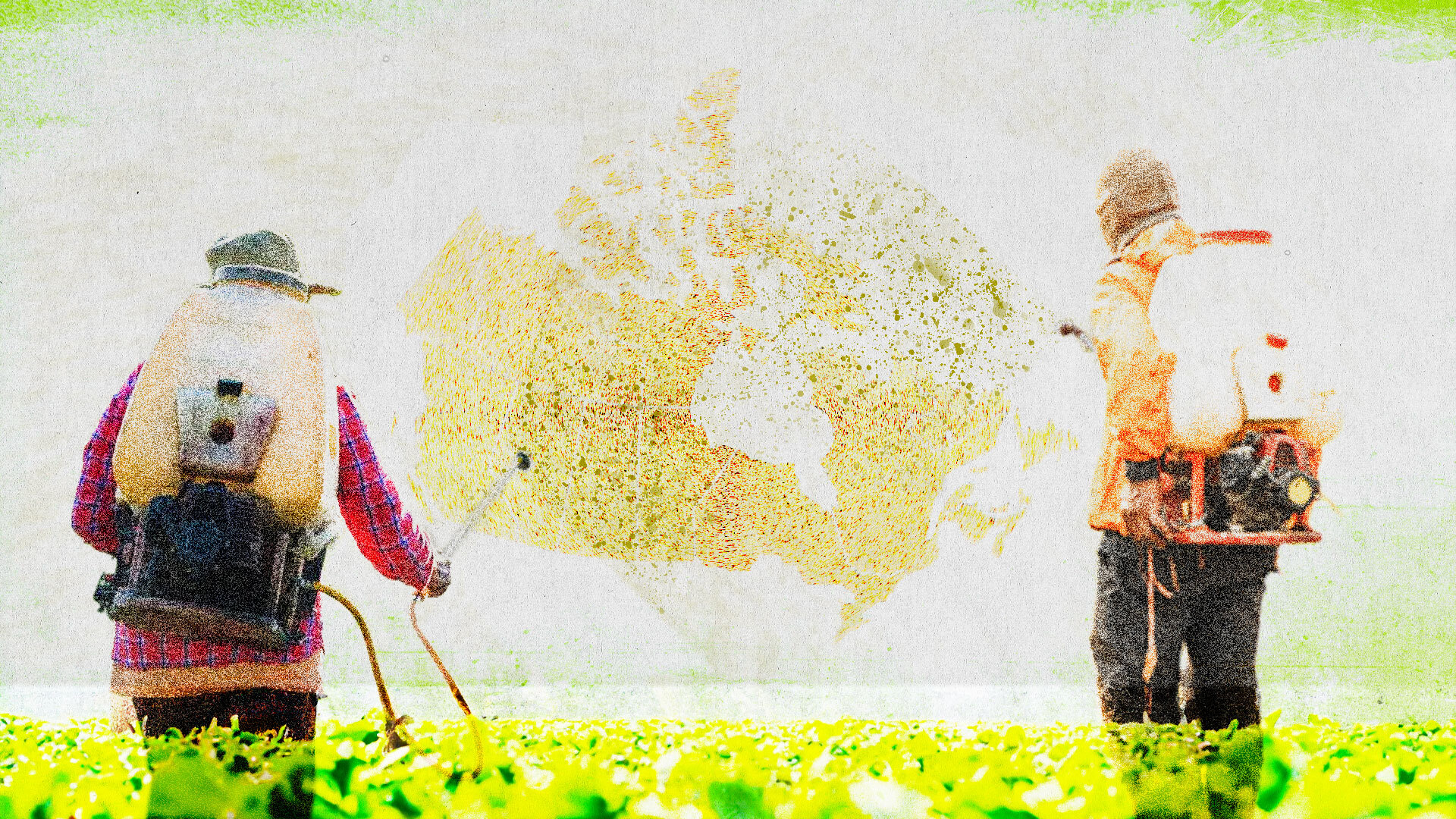Farms and forests across Canada could soon be sprayed with pesticides or planted with GMO (genetically modified organism) seeds that haven't been evaluated for safety by the country's regulatory agencies.
A new private member’s bill proposes to allow Canada's Pest Management Regulatory Agency (PMRA) and the Canadian Food Inspection Agency (CFIA) to "provisionally" approve new pesticides, seeds and animal feeds that are legal in two or more other "trusted" jurisdictions. These jurisdictions are yet to be determined and could be countries or "subdivisions" of countries, such as individual U.S. states.
The bill aims to help farmers buy technologies used in other countries in a "more timely manner," explained the bill's sponsor, Liberal MP Kody Blois, when he presented it to Parliament last month.
In its current form, the bill is unlikely to become law, but environmentalists are warning that a cohort of MPs backed by Canada's Big Ag lobby are leading a backdoor campaign to have its core tenets included in the 2024 budget. Blois' office did not respond to several requests for comment.
Currently, new products like pesticides or GMO seeds in Canada are reviewed by the PMRA or CFIA for safety and environmental risks before being approved for sale. Only after this review is complete — a process that can take years — can the product be sold and used in Canada.
If passed, the bill would require government officials to give pesticide and agricultural companies a "provisional" registration within three months if the chemical is approved in other countries like the U.S. This provisional registration will be considered valid indefinitely unless the government fully registers the product or the company decides to pull it from shelves.
"I couldn't believe it when I read it. I thought I was hallucinating," said Ecojustice lawyer and pesticide expert Laura Bowman. "It's beyond reckless."
The bill risks forcing the federal government to approve products dangerous to the environment or human health without consulting or even obtaining data about their risks, potentially including banned pesticides like DDT, she said. These data are typically provided by companies and reviewed by officials as part of the registration process.
The new rules risk exacerbating problems with Canada's existing regulatory system, which is already among the most permissive of toxic pesticides on the planet and is plagued with transparency problems. In the last year alone, two Canada's National Observer investigations revealed the PMRA downplayed to Canadians the health dangers of two pesticides that harm the endocrine system, cause cancer and birth defects and pose severe health risks to fetuses.
Without this requirement, there is no longer an incentive for the companies to provide the data, leaving officials "in complete darkness" about potential risks from their products. And once a product is approved, it takes a "herculean effort" to get it banned again. That is because the onus falls on federal officials to prove how new evidence about its risks justifies implementing a ban, Bowman said.
Those dangers risk being compounded by how the products might be used here, which could differ from their use in other countries. For example, under the bill, a product approved in the U.S. primarily for citrus fruit could be granted provisional approval in Canada but be used here with different application techniques on a completely different crop.
Bowman explained those changes risk causing environmental damage or health threats in Canada that were overlooked in the other country's risk assessment.
The bill harkens back to an earlier "conditional registration" provision in Canada's pesticide laws that let the PMRA "conditionally" approve pesticides for five years without undergoing a full health and environmental safety review. A 2015 report by the federal auditor general lambasted the agency for failing to review the chemicals within five years and simply renewing the conditional registration instead.
Facing criticism, the then-Health Minister Jane Philpott ended the practice in 2016.
"This is a very worrying procedure," said Friends of the Earth CEO Beatrice Olivastri in an email. It is "very peculiar" for a bill to attempt to modify public health and environmental laws without formal consultations, giving her the impression it is "an end run on due process/democracy."
Her concerns are shared by the National Farmers Union’s director of research and policy Cathy Holtslander. The bill "basically hands over the regulation of seeds and pesticides to other countries," giving them control over "really important parts" of Canada's food system.
This is beneficial to the world's largest agribusinesses, which exert even more influence over regulations in the U.S. and other countries than in Canada, she said. With only six firms controlling 78 per cent of the world's agrochemical market in 2020, and two controlling nearly half the patented seeds, those companies already have tremendous influence over Canada's regulators.
This bill would only make the problem worse, potentially forcing Canada to accept other countries' lower health and environmental risk thresholds. Canada's regulatory agencies are a safeguard meant to protect Canadians' health, ecosystems and economic interests; "sidestepping" them to blindly approve pesticides used in other countries "is not democratic," she said.
Helping ease trade costs for those corporations and other agribusinesses is the driving force behind the bill, Bowman added. The U.S. in particular is more lenient with its pesticide rules than Canada, putting Canadian farmers, especially the ones operating at an industrial scale, at a competitive disadvantage compared to their American counterparts.
Big Ag's support for the bill is evident among the groups that have endorsed it. Canada's leading agrochemical lobby group, CropLife Canada, has praised C-359 on social media but declined an interview with Canada's National Observer about the bill.
In a Tuesday interview with Canada's National Observer, Canadian Federation of Agriculture president Keith Currie said the farm organization will give Blois "all the support he needs" to make the bill become law. The group has been lobbying "for years" to help farmers more quickly access pesticides, seeds and other technologies approved internationally but not in Canada.
His group sees C-359 as a way to "expedite this process" while ensuring that "if there are any red flags along the way," Canada's regulators can still do their "due diligence" and evaluate the products' health and environmental risks.
As it is currently written, Bill C-359 would require the government to approve new feeds, seeds or pesticides used in two or more so-called "trusted" jurisdictions within 90 days unless the product is found to violate Canadian laws. But that three-month window to review the product is too short to properly assess the risks because most full health and environmental reviews take years to complete, Holtslander said.
Bowman concurred, noting the measures as written inspire little confidence Canada's regulators will be able to adequately protect Canadians from new, potentially dangerous chemicals.
"It has got a recklessness to it that is just staggering," she said.
This is a very slippery slope
This is a very slippery slope that could lead to the deregulation of all sorts of industries and practices in Canada (pesticides, drugs, guns) with the argument being why evaluate products ourselves when they are already approved elsewhere. This becomes particularly problematic if the US is used as the standard. Populist views and industry lobby groups are exerting more and more control over government in the interest of profit. Instead, the Canadian government should look to streamline certification processes without compromising due diligence. Maybe lessons to be learned from EU countries instead of US.
From the article: "The U.S.
From the article: "The U.S. in particular is more lenient with its pesticide rules than Canada, putting Canadian farmers, especially the ones operating at an industrial scale, at a competitive disadvantage compared to their American counterparts."
That's a pretty big assumption. So for instance, if a Canadian farmer wants to sell to the EU, stricter Canadian rules are an advantage, not a disadvantage, because the EU won't accept a lot of US-produced agricultural products precisely because of lax US agricultural rules around pesticides, herbicides, hormones, GM products and so on.
Then there's organic farming, a direction our agriculture should be going. Stricter pesticide rules might seem to be merely irrelevant for an organic farmer that doesn't use any--but the process of shifting a farm from not-organic to organic can take a long time due to persistent pesticide residues on the land. Stricter pesticide rules would on average make this process easier, so again an advantage.
Finally, the big companies producing pesticides have a great deal of organizational and marketing muscle. It's often unclear whether most farmers get net benefit from many of their products or if they're just sucked in by effective marketing or locked in structurally to "the (corporate) way it's done". I'm not at all confident that lack of the latest and greatest Monsanto or Cargill product actually reduces Canadian farmers' competitiveness.
Actually, organic farmers DO
Actually, organic farmers DO use pesticides, and they use a lot of them. The difference is that a number of them (copper sulfates, and sulfer products) are basically so old they've been grandfathered in and have never been subjected to today's standards for approval. If copper products, for example, were subjected to tests on impacts on soil microbes, they'd be refused registration today. Organic farming is an environmental threat, not a solution.
I'm intrigued when you imply,
I'm intrigued when you imply, but don't actually state, that chemicals marketed in Canada have gone through stringent processes before being approved.
"...today's standards for approval."
Are you able to provide any reference to knowledgeable source, considered adversarial to the chemical industry, that agrees with your characterization? The article mentions EcoJustice; do you figure the lawyer quoted is just blowing smoke out her ass or does she, perhaps, know a thing or two?
I suggest you review the
I suggest you review the current legislation and regulations in Canada.
https://www.canada.ca/en/health-canada/services/consumer-product-safety/...
I'll take that as a "No, I
I'll take that as a "No, I can't offer any evidence that a knowledgeable source, antagonistic to the chemical industry, has offered praise for Canada's regulatory regime for the industry".
I understand reading the
I understand reading the existing legislation and regulations might be a hardship for some.
A private member's bill,
A private member's bill, introduced by one of the younger MPs (~32) who has gained chairmanship of the Commons' Standing Committee on Agriculture and Agri-Food. I would like to know who authored the bill.
Let this be an example that age is not an indicator of anything, aside from the years one has lived to gain experience and support an informed worldview. In spite of Mr. Blois's assertions that he is a voice for youth, and environmental issues was a primary concern he identified when speaking to residents during his campaign*, he introduces such a bill. Europe has a very old farming tradition, and a very large, successful farming sector; why does Mr. Blois not suggest that Canada follow the European model of legislation and regulation?
*https://dailyhive.com/vancouver/mp-kody-blois-kings-hants-nova-scotia
If you examine lists of
If you examine lists of approved pesticide active ingredients in Canada and EU, you won't find that many differences.
So, the implication is that
So, the implication is that you would have no objections, then, to Canada's adoption of all current or pending EU regulations regarding chemicals?
You're quite adept at rhetorical slight-of-hand; is your livelihood somewhat reliant on lax regulation of the chemical industry?
How politicians sign away our
How politicians sign away our rights and protection by letting big business have agreements which ban government interference. As well as allowing these companies to sue us (the government ) for potential losses. Total garbage and a loss of protection. 40 years of free market capitalism is destroying our society. I lost my faith in Health Canada decades ago when i could not get answers to questions. after being referred 5 times finally from the Minister, confidential info. BS
This is a lot of space for a
This is a lot of space for a private members bill. They generally die on the order paper. The problem, as I see it, is that you'd first have to have a mechanism for determining which nations have registration requirements that are equivalent or tougher than ours. And, at a minimum, you'd also want to see and evaluate the datasets supplied to those nations by the registrant.
I'd also thought that the 'fear and loathing' around GMOs had diminished. Like it or not, we are going to need plants engineered to be more climate resistant and pest resistant sooner than later (and more widespread adoption might reduce pesticide use significantly).






Comments